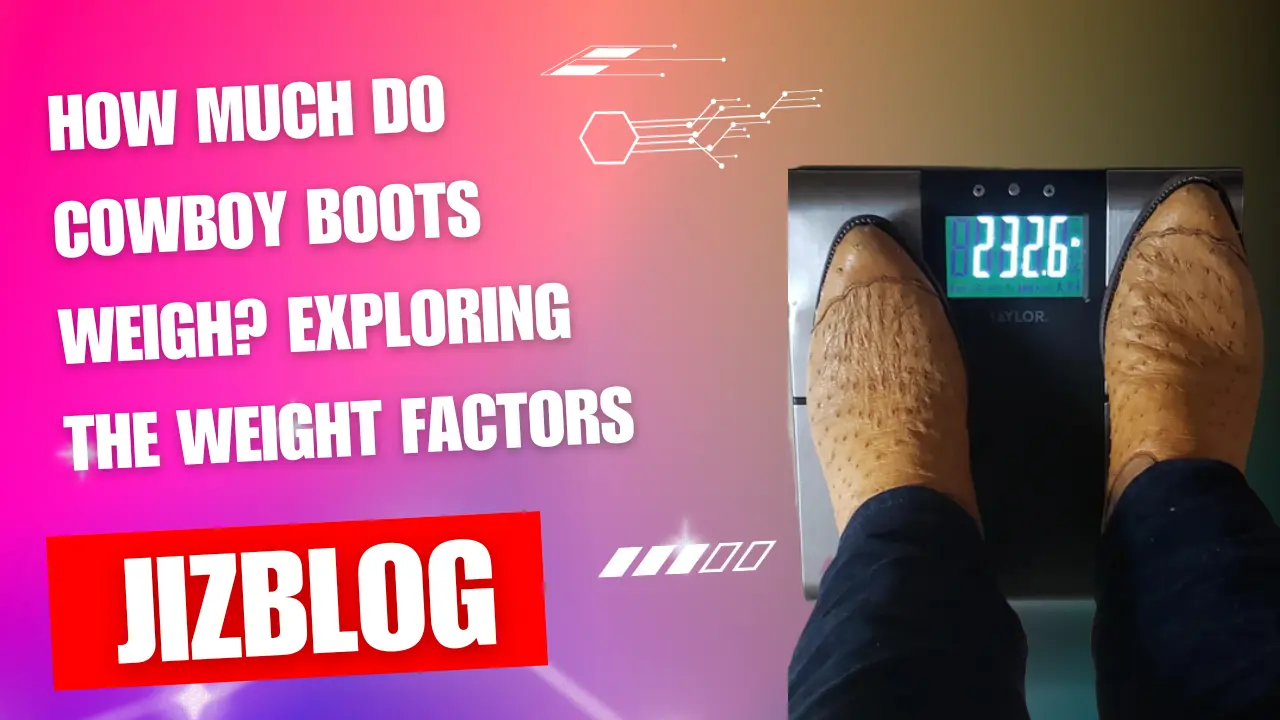Howdy, boot buddies! Have you ever slipped on a pair of cowboy boots and thought how much do cowboy boots weigh? Trust me, I’ve been there. I once compared the weight of my trusty boots to a couple of ornery rattlesnakes—I was curious about the load my feet were carrying. In this post, we’re diving into the nitty-gritty of cowboy boot weight, unraveling the mystery behind the heft. So, join me on this journey as we tip our hats to the importance of knowing just how much your beloved boots bring to the scale without losing an ounce of their charm.
Average Weight of a Pair of Cowboy Boots
Most cowboy boots weigh between 2 to 3 pounds per pair. This average weight encompasses both traditional all-leather constructed boots as well as modern boots made with blended materials.
According to statistics, here is the typical weight for some of the most popular cowboy boot types:
- Classic Western Cowboy Boots: 2.5 to 3.5 lbs
- Roper Cowboy Boots: Around 3 lbs
- Exotic Skin Cowboy Boots: 3 to 5 lbs
- Work Cowboy Boots: 3.5 to 5.5 lbs
- Cowboy Boot Accessories: 1 to 2 lbs (for leather boot bags, etc.)
As you can see, traditional Western cowboy boots tend to be on the lighter-weight side, while more heavy-duty work boots with protective features weigh significantly more.
Below we’ll look at some of the most important factors that influence cowboy boot weight and see how the construction and materials impact the number on the scale.
Table: Average Weight of Common Cowboy Boot Materials
| Material | Average Weight Per Boot |
|---|---|
| Cowhide Leather | 25 oz |
| Calfskin Leather | 15 oz |
| Exotic Leather | 30-40 oz |
| Rubber Outsole | 10 oz |
| Rubber Heel | 5 oz |
| Wood Outsole | 7 oz |
| Wood Heel | 3 oz |
| Synthetic Outsole | 5 oz |
| Synthetic Upper | 10 oz |
| Synthetic Lining | 2 oz |
What Makes Cowboy Boots Heavy? Key Construction Factors
From the materials to the design, several signature components of cowboy boots contribute to their total weight. Here are some of the essential elements that add heft:
Leather Type
The leather is arguably the most important factor when determining cowboy boot weight. Thicker, high-quality leather from the hide will result in a heavier boot. Luxury exotic skins like alligator or ostrich leather can add a noticeable amount of weight due to their density and thickness.
Lining
Genuine leather lining rather than fabric lining will naturally make boots weigh more. Full-leather lining provides softness and comfort though.
Shaft Height
The taller the shaft height, the more materials are involved, increasing total weight. Short-ankle cowboy boots will be far lighter than tall, cavalier-style cowboy boots.
Toe Shape
Steel-toe cowboy boots are significantly heavier than non-steel-toe boots. The steel box toe adds strength and protection at the cost of extra weight.
Outsole
Leather outsoles are traditional but tend to be heavier than modern rubber outsoles. Rubber also provides more traction.
Heel
Stacked leather heels add stability but also increase weight versus lighter wood and rubber heel options.
Shank
The shank provides shape and structure. Steel shanks are durable but heavy. Synthetic shanks are much lighter.
Construction
Handcrafted boots with double stitching will weigh more than quickly machine-massed-produced boots. But they do offer better quality.
Boot Size/Calf Circumference
Larger boot sizes and wider calf circumferences require more materials and affect weight.
Design Elements
Intricate stitching patterns, piping, and excessive overlays can increase weight over minimalist designs.
As you can see, boot weight is definitely something to consider when choosing cowboy boots. Let’s look closer at how exotic leathers and boot height especially impact the weight.
Table: Average Weight by Cowboy Boot Height
| Boot Height | Average Weight Per Boot |
|---|---|
| Ankle (6-8 in) | 15 oz |
| Mid-Calf (10-12 in) | 20 oz |
| Knee-High (14-16 in) | 30 oz |
| Extra Tall (Over 16 in) | 35+ oz |
Exotic Skin Cowboy Boots – Luxuriously Heavy
Exotic skin cowboy boots made from materials like ostrich, alligator, crocodile, and snakeskin offer a luxuriously attractive look. However, these exotic leathers tend to be thicker and more durable than regular cowhide leather, making them heavier in weight. Just how heavy? Here are the typical weight ranges:
- Ostrich Leather Cowboy Boots: 4 to 5.5 lbs
- Alligator Skin Cowboy Boots: 4.5 to 6 lbs
- Crocodile Skin Cowboy Boots: 5 to 7 lbs
- Snake Skin Cowboy Boots: 3.5 to 5 lbs
So you may have to put some extra pep in your step to wear these stylishly bold exotic skin boots all day long! But the unique patterns and standout style may just be worth the extra weight.
Cowboy Boot Height and Weight

Cowboy boot height can also significantly alter the total weight. The more material used in the upper shaft equals more weight on your feet.
Here are the typical weight ranges for common cowboy boot shaft heights:
- Ankle Cowboy Boots: 1.5 to 2.5 lbs
- Mid-Calf Cowboy Boots: 2.5 to 3 lbs
- Knee-High Cowboy Boots: 3.5 to 4.5 lbs
- Extra Tall/Cavalier Cowboy Boots: 4 to 6 lbs
As expected, tall boots like Cavaliers that rise over the knee to 16 inches high will weigh the most due to all that extra leather. Ankle-height cowboy boots only reaching 6 to 8 inches high will be the lightest.
When in doubt about choosing between tall versus short boots, go for the shorter height if a lightweight feel is your top priority. Or opt for a boot zipper or pull tabs to make taking tall boots on and off easier.
Do Lightweight Cowboy Boots Exist? Tips for Choosing
Traditional cowboy boots made from thick bull hide leather will almost always weigh more than the average shoe or boot. But you can still find more lightweight cowboy boots in today’s market if you look in the right places. Here are some tips for finding lighter cowboy boots:
- Seek out boots marked as being made from “calfskin” leather, as this is thinner and softer than bull hide or cowhide leather.
- Look for cowboy boots with a soft synthetic suede shaft rather than heavy leather. This material mix helps reduce weight.
- Check if the manufacturer lists the boot weight in the product details. Lighter boots may advertise being 13-15 oz. per boot rather than the standard 20-25 oz.
- Opt for ankle-length or short cowboy boots which require less material.
- Rubber soles, synthetic materials, and removable insoles also help create lighter cowboy boots.
- Consider used, lightly worn-in cowboy boots. These tend to be more flexible and lighter than brand-new stiff leather boots.
- Some high-tech composite-toe cowboy boots are now creating lightweight options that still meet safety standards.
And when in doubt about weight, go try some cowboy boots on in person! This will give you the best sense of their true weight when worn.
Does Cowboy Boot Weight Really Matter?

At the end of the day, does a few extra pounds of weight on your feet really make a difference when it comes to cowboy boots? For most wearers, boot weight matters far less than:
- Proper Fit – Snug in heel/ankle, wide enough in the toe box and calves
- High-Quality Materials – Durable, long-lasting leathers that get better with age
- Comfort Features – Cushioned insole, flexibility, shock absorption
- Intended Use – Fashion, riding, working, etc. functions
- Craftsmanship – Handmade with care and built to last
- Style – Choosing your preferred heel shape, toe shape, and embellishments
Conclusion
When it comes to cowboy boots, their weight should not be the only deciding factor. Prioritize fit, comfort, quality construction, and your intended use. With proper care and breaking in, even heavier traditional boots can start to feel light as a feather. While how much cowboy boots weigh is an important consideration, keep your priorities on finding the right pair for your needs.
The iconic cowboy boot continues to be a timeless staple of Western fashion. Understanding the weight differences in materials and construction will help you choose boots suited for all-day wear. Now that you know what affects cowboy boot weight, you can confidently mosey on out and shop for the perfect pair. Happy boot-hunting partner!
FAQ’s
What cowboy boot component adds the most weight?
The leather shaft and overlays add the most weight.
Do taller cowboy boots weigh more than shorter boots?
Yes, taller boots require more materials and weigh more.
Are exotic leather cowboy boots heavier?
Exotic leathers like ostrich and alligator are thicker and increase weight.
Should weight be the main factor in choosing cowboy boots?
No, proper fit and comfort should take priority over weight.

